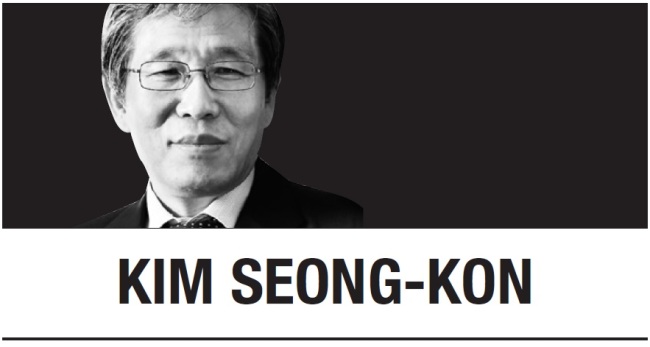[Kim Seong-kon] Don’t blame your parents, forge your own future
By Kim Seong-konPublished : May 8, 2018 - 17:42
 These days, young Koreans tend to blame their parents for their disadvantages. When they feel envious of their well-off peers, they blame their parents, muttering “Because of my incompetent parents, I was not born with a silver spoon in my mouth. And that made all the difference.”
These days, young Koreans tend to blame their parents for their disadvantages. When they feel envious of their well-off peers, they blame their parents, muttering “Because of my incompetent parents, I was not born with a silver spoon in my mouth. And that made all the difference.” Instead of doing their best to climb the ladder of social ascension, they easily give up from the beginning under the excuse of not being born rich and privileged.
As a result, it is very difficult to find an adventurous or ambitious young man or woman in our society these days. Few young Koreans seem to have dreams or believe that their dreams will come true someday. Young Koreans complain, “No matter how hard you may try, it is impossible to succeed unless you were born with a silver spoon in your mouth.” Instead of being determined to change their destiny, they are preoccupied with social determinism and give up even before they give it a try. “The times have changed,” they yell at the older generation, “You had ample opportunities in the past when the competition was not so intense.”
“We had ample opportunities?” Their parents are likely to retort. “Do you know how turbulent and destitute our society was when we were young? The per capita income was only $60 to $90 when we grew up. Now you are living in an affluent society with $30,000 per capita income. When we were young, few jobs were available and few opportunities came by.” Then they will add, “But we did not give up. We were not afraid of challenges. You should see the movie, ‘Ode to My Father’ to witness what we have gone through in order to make a better society for you. So stop whining.”
Of course, society should assume responsibility in part if we cannot accomplish anything no matter how hard we try. If the world economy is stagnant, then we can blame it, too. But we cannot blame our parents for what we are now and what we will be in the future. We should forge our own path by ourselves no matter how hard it is.
Recently I came across an essay written by an Asian-American college student who read Hwang Sun-mi’s international bestseller, “The Hen Who Dreamed She Could Fly.” He wrote, “As an Asian-American, reading this book brought up a lot of memories, and made me think of how I react to my parents and how I must constantly balance two seemingly different cultures.” Then he continues, “These parallels began with the very first page, with Sprout longing to escape the chicken coop. This scene is reminiscent of how many immigrants chose to leave their country to find not only a better life for themselves, but also their families.”
Comparing Sprout, the chicken who escapes the coop to the barnyard to hatch and raise a baby of her own, to his parents who immigrated to the States, he wrote, “Furthermore, the conditions that forced Sprout to leave are similar to the experience of many Southeast Asian and Southern Chinese immigrants to the US. Sprout wanted to have a child, and strongly believed that by leaving the country -- the coop -- she would once again be able to lay eggs. Also, right before she left, she was to some extent persecuted by the farmer and his wife who were contemplating killing her just like some in China, under the one child policy. Likewise, how many people immigrated to the US to have children, and how many Southeast Asian refugees fled their countries to escape death?”
However, problems occur when their children enter school and find they are different from others. He wrote, “When Greentop, the duckling that Sprout had hatched, was first born, he played with chicks, not realizing he was different. In fact, he might have even thought he was a chick. This reminds me of how many Asian-Americans who live in predominantly white communities do not even realize they are not white until someone points it out to them. They live out their lives, thinking that they are the same as everyone else and assume that everyone else sees them through a similar lens. However, when this illusion of being accepted by their peers is broken by the adults, they blame their parents.”
“Why did you bring me here? You are the reason for my misery.” Parents cannot but help be exasperated at these complaints. They want to shout back, “After all the troubles we have gone through to provide you with a better opportunity, is this all we get as a reward?” But how would young children know the miserable plight of their home country? How would they know their host country is far better than their home country?
Blaming your parents is lame. It is you, not your parents, who are responsible for your future. And it is you who must forge your life, future, and destiny.
Kim Seong-kon
Kim Seong-kon is a professor emeritus of English at Seoul National University and distinguished visiting professor at George Washington University. He can be reached at sukim@snu.ac.kr -- Ed.








![[Graphic News] More Koreans say they plan long-distance trips this year](http://res.heraldm.com/phpwas/restmb_idxmake.php?idx=644&simg=/content/image/2024/04/17/20240417050828_0.gif&u=)
![[KH Explains] Hyundai's full hybrid edge to pay off amid slow transition to pure EVs](http://res.heraldm.com/phpwas/restmb_idxmake.php?idx=644&simg=/content/image/2024/04/18/20240418050645_0.jpg&u=20240419100350)





![[From the Scene] Monks, Buddhists hail return of remains of Buddhas](http://res.heraldm.com/phpwas/restmb_idxmake.php?idx=652&simg=/content/image/2024/04/19/20240419050617_0.jpg&u=20240419175937)

![[KH Explains] Hyundai's full hybrid edge to pay off amid slow transition to pure EVs](http://res.heraldm.com/phpwas/restmb_idxmake.php?idx=652&simg=/content/image/2024/04/18/20240418050645_0.jpg&u=20240419100350)

![[Today’s K-pop] Illit drops debut single remix](http://res.heraldm.com/phpwas/restmb_idxmake.php?idx=642&simg=/content/image/2024/04/19/20240419050612_0.jpg&u=)